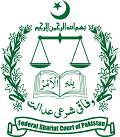Establishment
The Federal Shariat Court was established by virtue of the President’s Order No.1 of 1980 (Constitution (Amdt.) Order, 1980) as incorporated in the Constitution of Pakistan, 1973 as Chapter 3-A. The court is a unique institution with no parallel in the entire Muslim world. It is backed by powerful provisions of the Constitution. The Preamble to the Constitution explicitly affirms that sovereignty over the entire universe belongs to Almighty Allah alone, and the authority to be exercised by the people of Pakistan within the limits prescribed by Him is a sacred trust. Article 2A lays down that the principles and provisions set out in the Objectives Resolution are a substantive part of the Constitution.
Decision of the Court binding on High Court and Courts Subordinate to it.
Article 203 GG of the Constitution inter alia provide as under:-
“Subject to Articles 203 D and 203 F, any decision of the Court in the exercise of its jurisdiction under this Chapter shall be binding on a High Court and on all courts subordinate to a High Court.”
Powers to make Rules
Article 203J of the Constitution empowers the court to make rules regulating the practice and procedure of the court. Accordingly the Federal Shariat Court (Procedure) Rules,1981 have been framed.
Free Legal Representation
The rules of the court provide for free legal representation in cases where an appeal is filed from the jail and the appellant is not in position to pay for the services of a lawyer irrespective of the quantum of his sentences. Federal Shariat Court has taken a lead in this respect as compared to the most advanced countries in the world. The legal representation over there is generally provided to a pauper accused mostly through free legal aid societies and the courts rarely pay the bills of such representation. The Federal Shariat Court has made huge payments to Defence Counsel in 205 Jail Criminal appeals disposed of at Principal seat and Bench Registries of this court during the calendar year 2004.
No Court fee
Another important feature of the working of this court is that no court fee is payable either on petitions or appeals. While exercising its suo moto jurisdiction, the court’s policy is to take into confidence, and to associate in its working, the lawyers, the Ulema, the social reformers, the intellectuals and other members of the public. With this purpose in view public notices are published in the leading newspapers of the country inviting comments as well as representation from the citizens of Pakistan.
Sanctioned Strength of Judges of the Court
Article 203C of the Constitution lays down that the Court shall consist of not more than eight Muslim Judges including the Chief Justice and not more than three Ulema Judges having at least 15 years experience in Islamic Law, Research or Instruction.
Registries of the Court
Clause (6) of Article 203-C of the Constitution of Pakistan provides that the principal seat of the Court shall be at Islamabad, but the court may from time to time sit in such other places in Pakistan as the Chief Justice may, with the approval of President, appoint. In order to provide inexpensive and speedy justice at the doorstep of the litigant public, the four Bench Registries of the Federal Shariat Court at Lahore, Karachi, Peshawar and Quetta, in addition to the main Registry at Islamabad have been set up. These Bench Registries have been accommodated in the buildings of each Provincial High Court. Cases relating to the Provinces are filed and disposed of at these Registries by holding court sessions after short intervals.
Research Wing
The administrative work of the Superior Courts is controlled and supervised by the Registrar, Additional Registrar, Deputy Registrars, Assistant Registrars and Superintendents. A distinctive feature of the Federal Shariat Court in terms of administrative work, however, is the establishment of full -fledged Research Branch, comprising a Senior Research Advisor (B-21), a Research Advisor (B-20) and other supporting staff. The Research Branch has the honour of having assisted the court in Islamising thousands of Federal and Provincial laws by presenting detailed research notes and necessary materials to the Judges during the course of hearings and at the time of writing judgments on Shariat petitions. The modus operandi of the court is that when a Shariat petition is field, it is examined first by the Senior Advisor of the court to ascertain whether the impugned law or provision falls within the purview of the court’s jurisdiction.
Jurisconsults
As a Constitutional requirement, the court maintains a list of jurisconsults comprising prominent Ulema of the country who represent the various schools of thought. The Research Branch remains in touch with the Shariat Petition right from its registration in the court up to its final disposal.
Besides the two whole time Research Advisors, a panel of Jurisconsults, composed of Ulema of different schools of thought from all over the country, having extensive as well as intensive knowledge of Shariat, is maintained by the court. Whenever assistance is required by the court in deciding a question on Shariah, arising from a petition or appeal, they are requested to assist the court with their juristic views.
